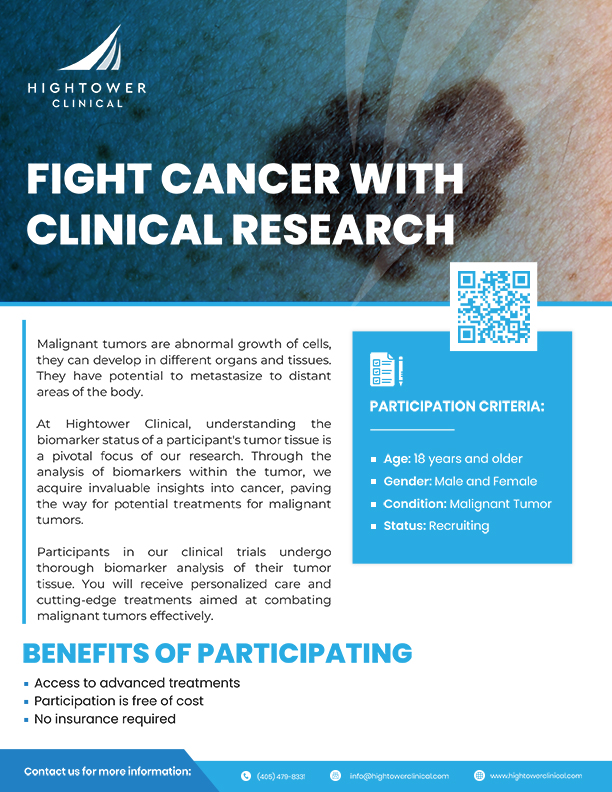Early signs may include persistent pain, unexplained weight loss, abnormal lumps, or changes in bowel or bladder habits.
Malignant Tumors Clinical Trials
Confronting a Lethal Threat with the help of clinical trials to get support and care
Enroll Now
The Threat of Malignant Tumors
Malignant tumors represent a formidable challenge in modern healthcare, characterized by abnormal cell growth that can infiltrate and damage surrounding tissues. These tumors are a significant concern due to their potential to metastasize, spreading to other parts of the body and complicating treatment.
Malignant tumors pose a particularly dangerous threat, as they can arise in various organs and tissues, leading to diverse clinical presentations and treatment complexities. Despite advances in medical science, malignant tumors remain a leading cause of morbidity and mortality globally.
Survival rates for malignant tumors vary widely depending on factors such as tumor type, stage at diagnosis, and treatment response.
Hightower’s Malignant Tumors Clinical Trials are at the forefront of redefining possibilities in cancer care and survival.
*Participation in the Clinical Trial is completely free of cost and is your choice.
*To participate, fill out the form, and someone from our research staff will call you to determine your eligibility for the Clinical Research Study.
Advancing Malignant Tumor Care Through Research and Innovation
A malignant tumor is an abnormal growth of cells that can invade surrounding tissues and spread to other parts of the body. Unlike benign tumors, which are non-cancerous and typically do not spread, malignant tumors are cancerous and pose a significant health risk.
Malignant tumors can arise in various organs and tissues throughout the body, and they are characterized by uncontrolled cell growth and the ability to metastasize or spread to distant sites.
In Hightower’s clinical trials, determining the biomarker status of a participant’s tumor tissue is a crucial aspect of our research. By analyzing biomarkers present in the tumor, we gain valuable insights into cancer and find a possible treatment for malignant tumors.
*All study procedures and study-related treatment, including the investigational drug, are free of cost, and insurance is not required to participate.
*The study doctor will take you through every step of the Clinical Trial before you decide to participate and will answer any questions you have about the study treatment.
What to Expect
If you decide to participate in the Malignant Tumors Clinical Trials, by filling out the form above, someone from the study team will contact you to determine your eligibility. The team will go over the study details with you to see if you meet the eligibility criteria for the Malignant Tumor Treatment
You will be invited to the study location for screening if you meet the criteria. The study site will be within a 50-mile radius of your current location. The study doctors will advise you on the duration of the clinical trials for cancer and the implications of your involvement in this research study. We invite you to ask as many questions as you like. After thoroughly explaining everything to the participants, they will be requested to sign an Informed Consent Form. We value transparency between our participants and investigators
*Study-related care is offered at no charge. Expert physicians and healthcare professionals conduct thorough physical exams and assessments.*


Age
18 Years and Older
Gender
Male & Female
Condition
Malignant Tumor
Current Status
Recruiting
Early Detection for Vital Health
Malignant tumors pose a significant health threat, often progressing silently until symptoms become evident. As a prevalent concern in oncology, these tumors require proactive screening and awareness of their basic symptoms for early detection and improved outcomes.
Screening for malignant tumors is vital due to their potential to metastasize and impact multiple organs, making early intervention critical for successful treatment.
Recognizing basic symptoms is important for possible treatment for malignant tumor;
- Unexplained weight loss
- Persistent pain
- Abnormal lumps
- Changes in bowel or bladder habits
Hightower emphasizes the importance of screening programs and public awareness campaigns to detect malignant tumors early. We also encourage you to participate in the ingoing clinical trials for your safety and betterment.
Frequently Asked Questions
How can screening for malignant tumors improve outcomes?
Screening allows for early detection, leading to timely treatment and better chances of successful outcomes.
How clinical trials advance cancer care?
Clinical trials test new treatments and techniques, pushing the boundaries of cancer care to find more effective therapies.




